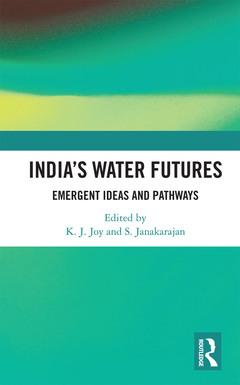India’s Water Futures Emergent Ideas and Pathways
Coordonnateurs : Joy K. J., Janakarajan S.

When it comes to water, we flush and forget. We use, abuse and almost never recycle.
Water sector in India, since the 1990s, has seen some new ideas formalised legally and institutionally, while others are still emerging and evolving. Confronting the reality of current water management strategies, this volume discusses the state of the Indian water sector to uncover solutions that can address the imminent water crises.
This book:
- Analyses the growing water insecurity, increase in demand, inefficiency in water use, and growing inequalities in accessing clean water;
- Sheds light on water footprint in agricultural, industrial and urban use, pressures on river basin management, depleting groundwater resources, patterns of droughts and floods, watershed based development and waste water and sanitation management;
- Examines water conflicts, lack of participatory governance mechanisms, and suggests an alternative framework for water regulation and conflict transformation;
- Highlights the relationship between gender discourse and water governance;
- Presents an alternative agenda for water sector reforms.
This volume, with hopes for a more water secure future, will interest scholars and researchers of development studies, environment studies, public policy, political studies, political sociology, and, NGOs, media and think tanks working in this area.
Foreword 1. Introduction: India Water Futures: Emergent Ideas and Pathways 2. Water Resource Development in India: Achievements, Shortcomings and Remedial Measures 3. Managing River Basins: Re-Examining the Biophysical Basis 4. Changing Land Use, Agrarian Context and Rural Transformation: Implications for Watershed Development 5. Environmental Flows in the Indian Context: Prospects and Challenges 6. Changing Water Use Practices of the Urban Middle Class in India: Insights from Metropolitan Calcutta 7. The Centralized Approach to Wastewater Management and Implications for Sanitation Governance: An Analysis of the Intent and Practice of the National Urban Sanitation Policy in India 8. Canal Irrigation Performance and Impacts: Applying Contingency Theory to Irrigation Management in India 9. Out of Balance: Agricultural Growth and Groundwater Depletion in Two Backward States of India 10. Reducing Water for Agriculture for Improving Productivity: Adapting and Up-scaling Innovative Approaches 11. Gender and Water: Why We Need Alternatives to Alternative Discourses 12. Inter-state Water Conflicts and Linguistic Identity in India: The Case of the Cauvery 13. Dams and Environmental Clearances: Learnings and Way Forward 14. Rationale for Independent Regulatory Agency for Water in India: Reconceptualizing Credible Commitment 15. Reforming India’s Water Sector: Which Way Forward?
K. J. Joy is Senior Fellow with Society for Promoting Participative Ecosystem Management (SOPPECOM), Pune, India, and is the Convener of Forum for Policy Dialogue on Water Conflicts in India.
S. Janakarajan is a professorial consultant at Madras Institute of Development Studies, Chennai, India and is the President of South Asia Consortium for Interdisciplinary Water Resources Studies, Hyderabad, India.
Date de parution : 12-2020
13.8x21.6 cm
Date de parution : 11-2018
13.8x21.6 cm
Thème d’India’s Water Futures :
Mots-clés :
Tamil Nadu; Watershed Development; groundwater resources; Water Sector; water governance; Groundwater Irrigation; wastewater management; PIM; conflict transformation; PPPs; Public Private Partnerships; Cauvery Water; Environmental Clearances; Inter-state Water Disputes; NGT; Environmental Flow; Cauvery Basin; River Basin; Independent Regulatory Authorities; Groundwater Depletion; External Task Environment; River Basin Management; EIA Notification; Increased Glacier Melting; Medium Irrigation Projects; BCM; Tonnes; NEAA
